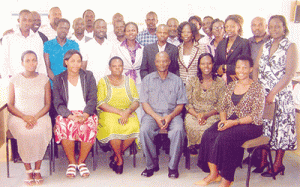A Boost for Psychology Education in Uganda

A group of educators is working to apply high-quality teaching standards nationwide.
In November 2012, Peter Baguma of Makerere University, Uganda, met with colleagues to discuss what they saw as the most pressing issues confronting psychology education in Uganda, among them quality and consistency across public and private universities and national colleges. The meeting addressed “Improving the Teaching of Psychology in Higher Institutions in Uganda Through a Harmonized Curriculum,” and its main purpose was to “develop a common vision on teaching psychology at higher institutions regarding the qualifications, resources, and sustainability through research,” as well as establishing the needs and challenges faced by teachers of psychology.
Baguma and other attendees, among them the Ministry of Education Commissioner for Higher Education and representatives from the National Curriculum Development Center, noted that there were several important differences regarding how psychology was taught in different institutions. Public universities had diverse curricula, more courses, and better-qualified professors, while private universities often consolidated courses to cut costs and used teaching methods that combined many distinct units of education. National colleges were consistent in their curricula but had limited flexibility, as lessons were supplied by the Ministry of Education and Sports.
The conference identified five main challenges to be addressed and participants made recommendations in each of the following areas:
- Teaching environment and assessment mode: increasing the number of teachers, teaching aids, and classrooms dedicated to psychology departments, more closely mentoring and supervising psychology students, and establishing more effective ways of assessing students’ progress in the field.
- Curriculum: Creating a common, well organized, and fully developed curriculum.
- Administration and management: Suggesting non-English speakers take 9 months of language classes to help them adapt to an English-speaking learning environment, choosing students based on interest and competence, and offering career guidance during orientation.
- Lecturer competence: Initiating increased training and “refresher courses” for psychology professors and encouraging lecturers to conduct psychology research.
- Students’ attitudes towards learning: Steering students toward a greater appreciation of psychology and developing a policy to aid students who are not adequately prepared for higher education.
At the conclusion of the seminar, participants acknowledged the continued need to address concerns regarding psychology education in Uganda. Future workshops are in the planning phase.





APS regularly opens certain online articles for discussion on our website. Effective February 2021, you must be a logged-in APS member to post comments. By posting a comment, you agree to our Community Guidelines and the display of your profile information, including your name and affiliation. Any opinions, findings, conclusions, or recommendations present in article comments are those of the writers and do not necessarily reflect the views of APS or the article’s author. For more information, please see our Community Guidelines.
Please login with your APS account to comment.